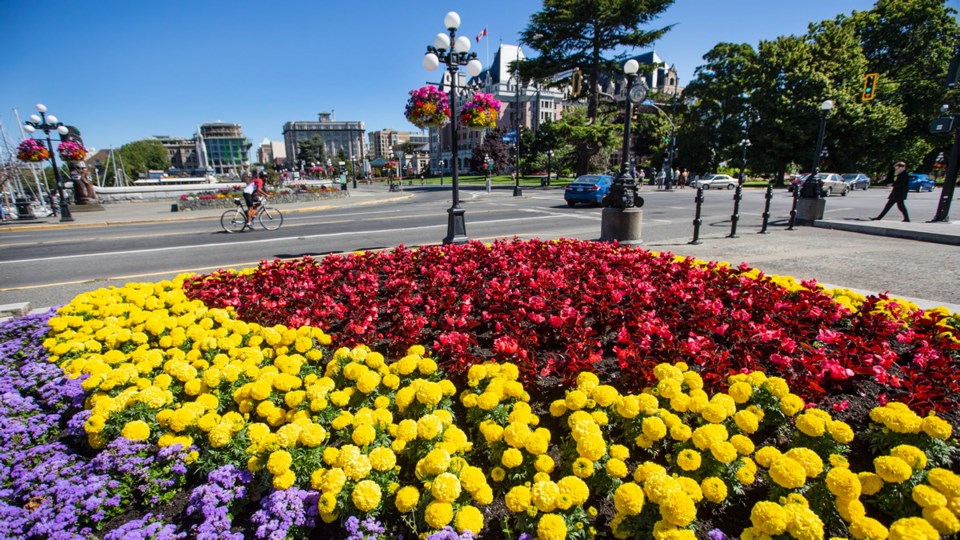The B.C. Day long weekend promises to deliver warm weather and mainly sunny skies.
Environment Canada is anticipating temperatures of 24 C on Saturday and Sunday, and 23 on Monday. A mix of sun and cloud is expected on all three days.
There are plenty of opportunities to enjoy the outdoors on the weekend but B.C. officials are reminding citizens to follow physical distancing and health guidelines to protect against COVID-19.
B.C. Ferries is expecting a busy weekend and recommends reservations. “Customers without a booking should expect sailing waits.”
Whether you are going in a vehicle or as a foot passengers, B.C. Ferries recommends arriving at the terminal at least an hour before sailing. Transport Canada’s virus screening is in effect and that means it will take longer to check in. Also, foot passenger capacity may fill up. B.C. Ferries urges passengers to travel at less busy times.
On the Horseshoe Bay to Departure Bay in Nanaimo route, those less busy times are typically between 8:30 p.m. and 10:40 p.m. departing Horseshoe Bay, and the 10:40 p.m. departing Departure Bay.
The busiest times are normally Thursday and Friday afternoon, as well as Saturday morning, with lots of travellers departing from Tsawwassen and Horseshoe Bay terminals.
In past years, B.C. Day Monday and the Tuesday morning have been popular times for people to return from Vancouver Island and the Sunshine Coast.
B.C. Ferries said if a passenger does not want to make a reservation or is planning to be a foot passenger on the Departure Bay to Horseshoe Bay route, they could consider travelling via Tsawwassen to Duke Point or Tsawwassen to Swartz Bay. The Horseshoe Bay to Departure Bay route can hit capacity at popular times.
B.C. is encouraging citizens to enjoy their summer vacation within the province. The pandemic has sparked an increase in tenting, camping and recreational equipment flying off the shelves.
If you’re hoping to visit or spend a night or more at a provincial park, most parks reopened for camping on June 1. Group campsites have been repurposed for extended family or single-party camping.
For more information on what’s open, go to bcparks.ca.
Some communities in B.C. are urging visitors to avoid them until the virus subsides.
On Thursday, the provincial government ordered the closing of Haida Gwaii to non-residents after an outbreak of COVID-19.
The B.C. Wildfire Service is warning that August is typically the busiest month for forest fires.
Between April 1 and Wednesday, there have been 239 wildfires in B.C. About 85 per cent resulted from human activity, the service said.
“We know people want to get out into the great outdoors, but it’s important that everyone stay vigilant about fire safety,” said Doug Donaldson, minister of forests, lands, natural resource operations and rural development.
“Fighting wildfires can be challenging at the best of times, but managing them in the midst of the COVID-19 pandemic requires B.C. Wildfire Service staff to operate with even greater care.”
Campfires are allowed in areas falling under the B.C. Wildfire Service’s jurisdiction but water should be kept nearby to extinguish them. Anyone wanting more information about what is allowed or not can go to: gov.bc.ca/wildfirebans. Also, remember that other jurisdictions, such as local governments, may have their own rules.
Safety tips:
• Campfires must not be larger than 0.5 metres high or 0.5 metres wide.
• Never light a campfire or keep it burning in windy conditions. Weather can change quickly, and wind may carry embers to other combustible material.
• Maintain a fireguard around the campfire. This is an area where all flammable materials (grass, leaves, kindling, etc.) have been removed right down to the soil.
• Never leave a campfire unattended.
• Have a shovel or at least eight litres of water on hand to extinguish your campfire.
• Make sure the ashes are cool to the touch before retiring for the night or leaving the area for any length of time.
• Anyone riding an all-terrain vehicle or dirt bike on Crown land must have a spark arrestor installed. To help reduce wildfire risks, check the condition of the muffler, regularly clear buildups of grass or other vegetation from hot spots, stay on dirt paths and avoid riding in tall grass and weeds.
• Smokers must dispose of cigarette butts and other smoking materials responsibly and ensure those materials are completely extinguished.
To report a wildfire, unattended campfire or open burning violation, call 1 800 663-5555 toll-free or *5555 on a cellphone.



